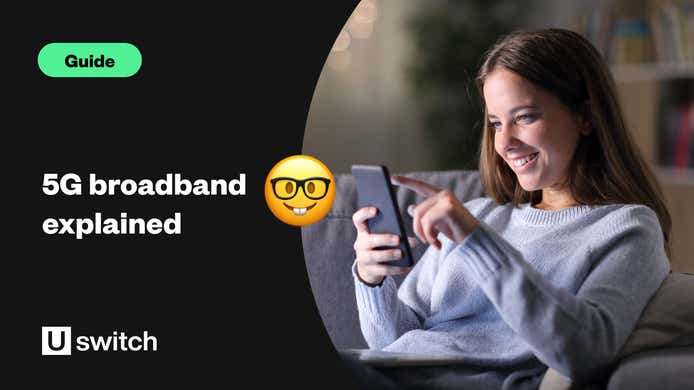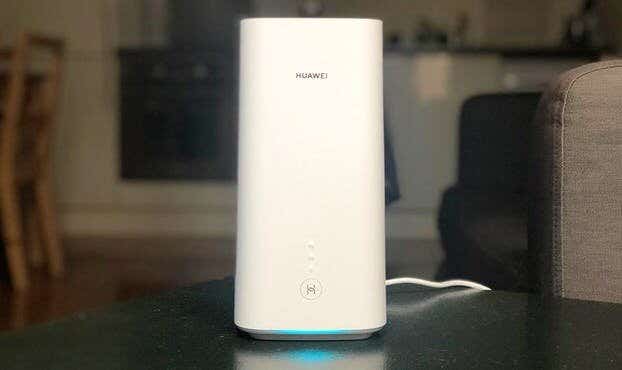
With nearly a third of UK workers (29%) working from home for at least part of the week in 2023, a strong and reliable broadband connection has never been more important.
In the near future, 5G home broadband may become a viable substitute for traditional fixed broadband, particularly if you live in an urban or suburban area.
5G broadband uses the same mobile internet technology as your smartphone, albeit with a router plugged in at home. In this setup, your 5G broadband router is equipped with a SIM card to capture 5G signals, and you can connect your appliances to it using Wi-Fi.
The choice between 5G broadband and a traditional fixed-line connection like fibre broadband involves finding out which would be better for you. And that hinges largely on the availability of wired broadband options in your area and the presence of a 5G signal at your property.
This article explores four reasons why 5G broadband can be a practical solution in the world of broadband.
1. Next day delivery
With such a growing reliance on the internet, consumers are rightly more concerned about facing lengthy installations or being offline for a period of time when they work from home.
This is where one of the big positives of 5G broadband comes in. 5G broadband is very easy for mobile operators to set up and requires minimal equipment on their end. This means if you live in a 5G area, you can expect to have your 5G device a mere day after ordering, which limits your internet downtime so you can continue using it straight away.
As mentioned, 5G broadband is currently available to 77% of the UK population, making it a great option for people living in urban or suburban areas. With full fibre broadband only available to just over half (52%) of UK homes, 5G is a more available alternative if you want to get online quickly.
2. Set up simplicity at home
As well as a fast delivery, 5G has an incredibly fast set up time in comparison to other traditional broadband types. If you sign up, you’ll receive a 5G home Wi-Fi router that can be plugged into any power source in your home, unlike a traditional broadband router that has to be plugged into a broadband or phone socket.
For the best results, you need to place the router in an area with minimal electronic devices, large furniture or thick walls surrounding it. Placing it near a window would be the most ideal, but this shouldn’t be a problem with the flexibility of placing it anywhere a plug socket is located in the house.
5G broadband is a step towards getting rid of the days of complex installations and lengthy setups and makes high-speed connectivity accessible to the majority of households.
Traditional broadband services often involve lengthier installation processes that need a visit from an engineer and can take up to three hours. However, that convenience can cost you in other areas, with fibre coming out on top when it comes to speed, distance, operational cost, response time and latency.
3. Viability vs traditional broadband
The traditional broadband infrastructure has long been the backbone of our online connectivity, and it is still the best option for a reliable line, depending on the area.
However, as we consume more online media, the limitations of traditional broadband in certain areas of the country have become increasingly apparent.
Areas that previously fell into areas that were limited by slow speeds can now access much faster speeds (up to ten times faster than 4G) thanks to new 5G locations being rolled out. Unlike your mobile, which can experience fluctuations in 5G while moving around throughout the day, your 5G home broadband is stable, provided it is placed in the optimal position to connect to the 5G network.
Bear in mind when considering location, 5G mobile broadband may encounter similar coverage issues as your mobile phone reception. Therefore, if you're addressing a pre-existing 5G coverage gap, a simple fixed-line connection with a Wi-Fi range extender could be a more viable solution.
Another perk is the price. 5G networks are cheaper to expand, so you can also expect to pay less for a 5G home broadband plan.
For example, Three currently has a discounted 5G broadband offer on a 24-month contract with next-day working delivery of all the equipment. For £11 a month for the first six months and then £22 a month, you can get average speeds of 150Mps.
Throw in the added bonus of no set-up costs, and you get this for a very reasonable total cost of £462.00, which is cheaper than many fibre broadband deals.’
4. Gaming
Every gamer knows how important a strong and reliable internet connection is in order to play on their favourite consoles. So, does 5G broadband stack up when it comes to gaming?
Online gaming is a real test of your internet service, and any frailties will be exposed. But the good news is that with the speeds that 5G offers (well over 200Mbps), it could make it preferable to other internet types, especially if you don’t have full fibre.
There are three things gamers need to get out of their internet connection:
Low latency
A fast, consistent connection
A good amount of data (if applicable)
Latency is the time it takes your computer to receive a response after sending out a signal, making it the most important due to the time-sensitive nature of online gaming. With the coverage that 5G offers and as long as your router is positioned in a place with minimal blockages, latency shouldn’t be a problem.
And if you are experiencing poor signal quality, simply relocate your router to a better position within your home. No cables, technicians, or appointments are necessary.
One thing gamers should be aware of if they choose a 5G broadband deal is their plan’s data cap, which limits how much data they can download from the internet.
Most popular video games are huge files, sometimes reaching over 100GB in size, so just make sure you have a plan that matches these demands.
Going over your data cap is not fun. Usually, you’ll get hit with fees that compound the more you go over; some ISPs may even cut off your internet service completely, so always double-check how much data you are using.
Get ultrafast speeds tomorrow with Three 5G broadband
When choosing the right broadband for you, it is always important to consider what you value most.
The current infrastructure favours fibre technology in terms of speed, operational cost, response time, and latency. But 5G also excels in installation fees, monthly price, reliability, security, and ease of setup.
But before coming to any decision check the availability of 5G home connection in your area. If you live in an urban area, chances are you can access a sufficiently strong 5G connection, eliminating the need for a fixed part-fibre broadband connection and allowing you to enjoy the advantages it offers.
Once you have decided to opt for 5G broadband, Three is a great provider to consider - as long as it is available in your area. With its guarantee of next working day delivery and easy set-up, you won't have to worry about drilling into your walls or scheduling an engineer visit to get online - just enter the SIM card, plug in the router and connect your devices.
You'll also have flexibility in positioning your Three 5G Hub in order to make the most of its average 150Mbps speeds. Additionally, there's no requirement for a phone line, potentially saving £15 to £20 per month with Three’s offering, compared to a lot of other fibre broadband deals.
Three’s 5G broadband is also a good option for keen gamers. Operating on the UK’s fastest 5G network and with plans to include unlimited data you can be safe in the knowledge that you can game as much or as little as you want.
Our best mobile broadband deals
Check out our range of 4G and 5G mobile broadband deals.



